Blogging is an attractive activity because it can be a creative outlet for sharing your unique perspective with the world. Best of all, the opportunities are endless.
At the same time, you want to add value for your readers (and maybe even turn your passion into income).
In this post, we lay out how to monetize a blog and provide examples of the most popular (and lucrative) types of blogs, all with the goal of helping you find inspiration as you get started with your own blog.
How Do Blogs Make Money?
Line any labor of love, blogging is still labor. Good news is that there are a number of ways to make money from that labor, including:
- Advertising - Advertising networks such as Google AdSense will pay to show ads to your visitors. You get paid a commission for the clicks you earn.
- Affiliate Marketing - You can get paid to promote products to your audience by joining an affiliate program such as Amazon Associates. You earn a commission from sales generated by your blog.
- Lead/Demand Generation - You can always use your blog to promote your own business whether you provide a service, run an ecommerce store, sell digital products such as online courses, or run a subscription/ content model for exclusive content.
Keep in mind, though, that none of these can work if you don't first create valuable content that attracts an audience. The last thing you need is to make your blog a billboard in the middle of a desert.
With that said, there are some popular niches that do really well with blog monetization when implemented effectively.
1. Fashion
In this category, readers can find posts like fashion obsessions, back to school looks, makeup tutorials, and more. A common practice is to include sponsorships, like the one shown below with Vooray. The two brands collaborated on a gym bag in 2017, releasing it on the LSF blog and website:
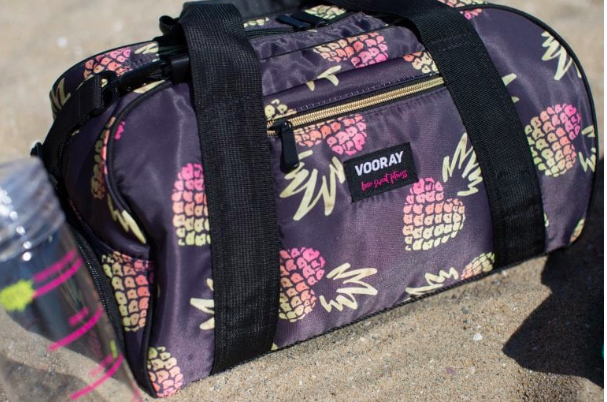
With brand partnerships, companies usually seek out heavy hitters in their industry and offer the brand the ability to design a product exclusively for base pay and a percentage of the profits. And, while this happens a lot in the beauty industry, it's definitely not an industry-specific idea.
2. Food
As a self-proclaimed foodie, food blogs are my favorite types of blog. They usually follow a similar content format of categorically-organized recipes. Some have videos to pair with those recipes, as well as social media channels that all connect to the blog in some way.
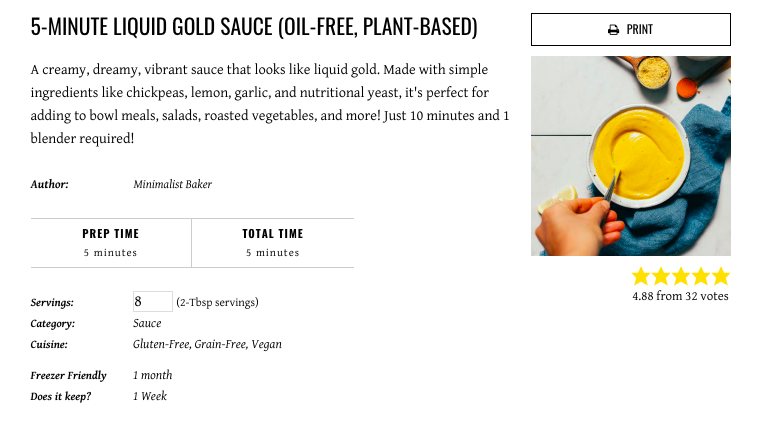
Above is an example of one of my favorite food blogs, Minimalist Baker. Note how the title of the post contains information that might pull a foodie in — "5 minutes," and "plant-based". This recipe will appeal to anyone who searches for easy, no-fuss cooking.
Minimalist Baker provides this value to attract readers, and they use affiliate links to monetize their blog.
3. Sports
Sports blogs exist for every type of sport imaginable — even squash. If you have a passion for athletics and love writing, this may be the perfect intersection for you. From covering games to giving player insights, sports blogs are an important source for fans to catch up on what they missed.
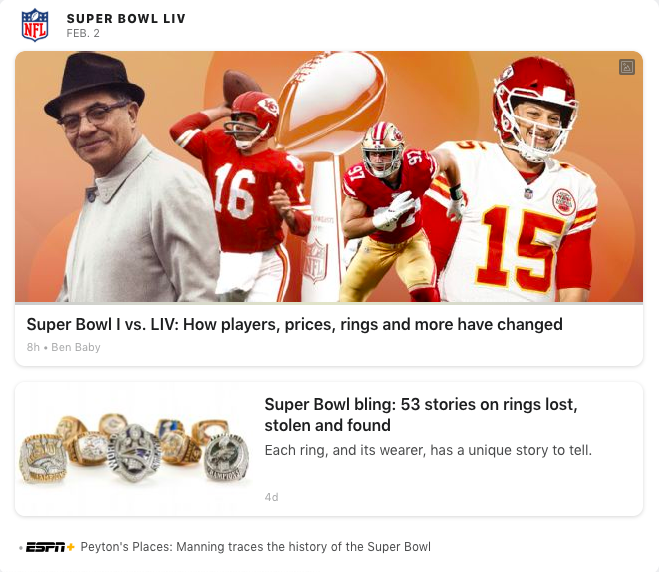
Like this screengrab from ESPN, sports blogs also report on news going on in the industry — these two stories are about the Super Bowl. So if you're thinking about doing a sports blog, you have options. You can either focus on a specific sport, or take a more holistic approach, like ESPN.
ESPN uses their website and blog as a companion for their media presence, to attract and retain viewers, but other sports blogs use banner advertising to monetize the traffic they earn.
4. Travel
If you love to go on trips and capture the moments, a travel blog might be right up your alley. There's something about travel blogs that are so relaxing, in my opinion — seeing pictures of gorgeous destinations is always a treat. That's why, if you're thinking of launching a travel blog, you might want to invest in a nice camera.
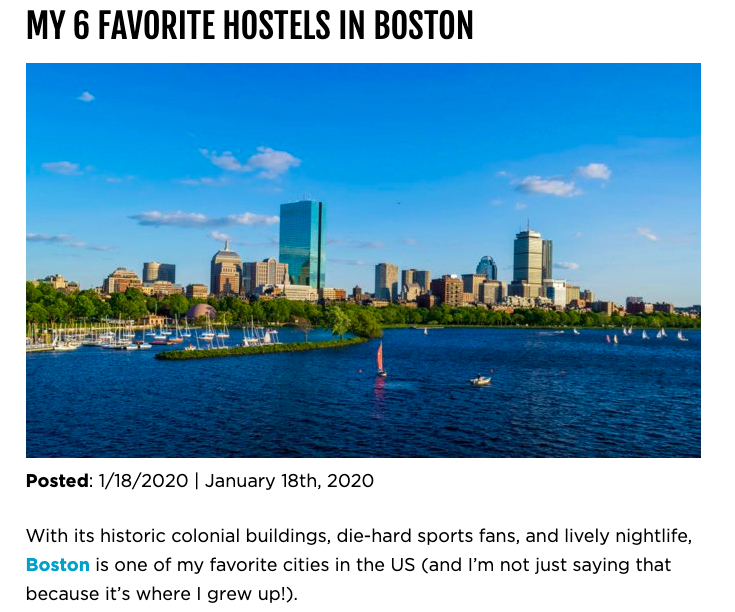
For instance, look at this vibrant, colorful photo of the Charles River. (I'm probably a little biased, considering I live in Boston and commute over this river daily). To rank highly on the SERPs, you'll want to have high-quality images so travel enthusiasts are compelled to view your posts.
Travel blogs can use a number of avenues to generate income. Most commonly seen are banner ads, native ads, sponsored posts, and affiliate links for products such as suitcases or airline tickets.
5. Lifestyle
Lifestyle blogs are probably the most versatile of blog types. Aptly named, lifestyle blogs are about a person's life. What they like to do, where they like to eat and shop … think of a lifestyle blog as a website for influencers. Check out this lifestyle blog, Love Taza, as an example:
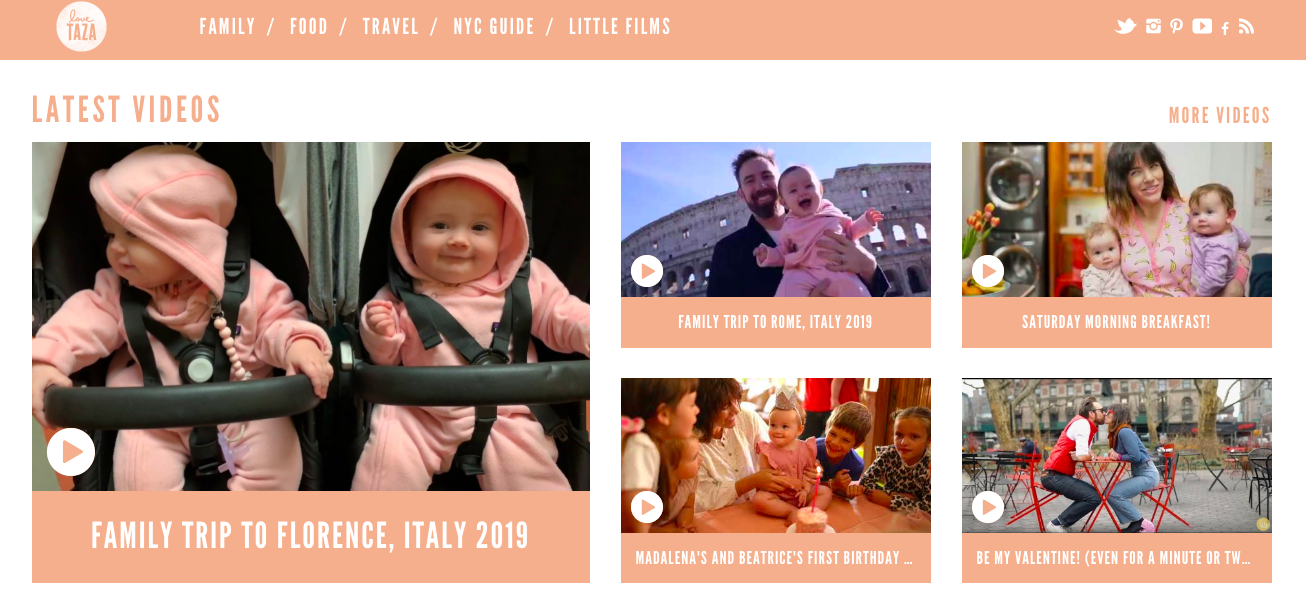
A number of influencers use blogs as a way to market themselves and build a more solid following. Oftentimes, businesses will look for an influencers' blog or website to find out more information on them (as well as contact information) if they're interested in cultivating a partnership. If you're interested in becoming an influencer or simply want to share more of your life with friends and family, this might be the right blog for you.
You can monetize a lifestyle blog with affiliate links, native ads, and sponsored posts. Banner ads for ad networks also work well here.
6. Parenting
This is another guilty pleasure blog type of mine, mostly because parenting blogs have incredible interior decorating going on (another blog type, FYI). Parenting blogs usually give advice and share relatable stories to other parents, or those expecting.
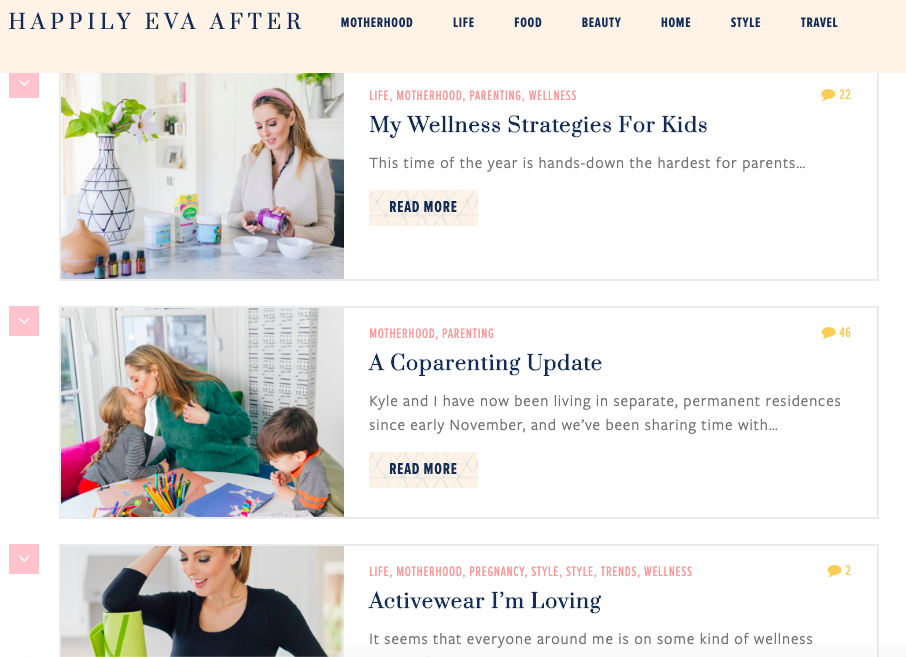
Parenting blogs can be a great resource to new parents, as well as a way to branch out into other outlets. Plenty of parenting blogs have added a YouTube channel to keep content fresh, more engaging, and expand into new target markets For instance, Happily Eva After, the parenting blog shown above, now has a thriving YouTube channel.
Parenting comes with a lot of opportunity for product purchases, so the opportunities for monetization are limitless.
7. Gaming
Gaming has turned into an industry that now typically happens online. Between downloadable content (DLCs) and games that depend on an internet connection, it's hard to be a gamer if you're not online. Because of that, gaming blogs are extremely popular.
From game announcements to corporate sponsorships, gaming blogs can go a couple of different ways. They can include game reviews, walkthroughs, cheat codes, or content codes. Since gaming YouTube channels attract a lot of fans, this type of blog can also grow into a YouTube channel all its own. Additionally, it's a good space for gamers to connect with each other, especially if you create opportunities for your readers to engage (like in the comments section of your blog).
You can monetize the blog with banner ads, or you can use the blog to drive demand for streaming channel where more views mean more money.
8. B2B/Marketing
You've probably guessed — this blog that you're currently reading is an example of the B2B/Marketing category. Because we offer marketing products as part of our CRM platform, we use our blog to help millions grow better, whether they use our products or not.
By creating content for marketers, a marketing blog can attract marketers, and that's the target audience for a marketing software company. By providing value, you can increase your trust and authority in the industry, which can help the positioning of your goods or services with that demographic.
I want to make it clear that marketing isn't the only industry represented by B2B blogs. Instead, it's more of an example of the type of B2B blogs you can find out there.
If you're in a different industry, you can definitely use that as a cross-section for a B2B blog. For more information about B2B marketing and how a blog would look in that industry, check out our ultimate guide here.
9. Heath and Fitness
You may have heard of "Fitstagrams" (Instagram accounts dedicated to fitness journeys), but fitness blogs are also a dime and a dozen. These blogs recommend workout tips, healthy recipes, and sometimes offer full workout plans in a "How-to" format, like this post from Nerd Fitness.
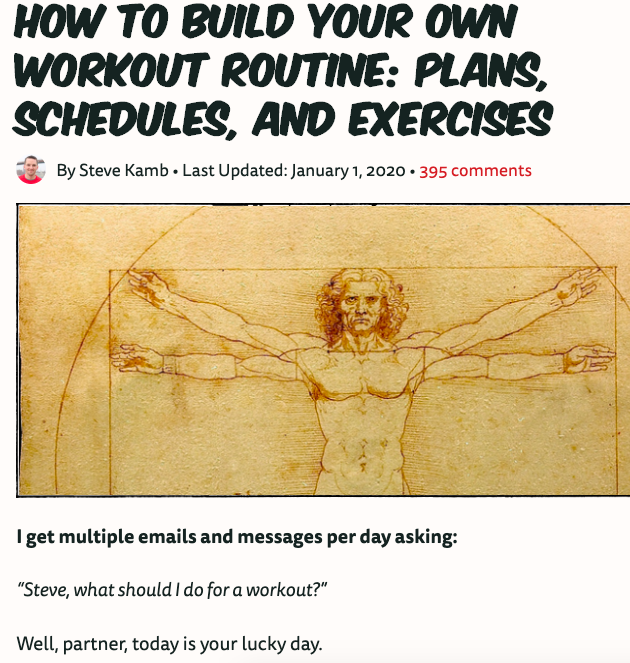
Fitness blogs can be a great companion to those looking to embark on their fitness journey. They're usually geared towards a holistic view on healthy living in general, not just working out. Readers might be interested on perfecting their fitness routine, finding new ways to make healthy eating exciting, or looking for motivation to stick to their fitness lifestyle.
This is not an expansive list. If you have an idea, see what can come of it. The good thing about blogs is that you can take it wherever you want, and if the content is compelling for a certain readership, money and notoriety comes after.
Here are some examples of high-grossing blogs and the categories they're in.
1. Love Sweat Fitness
Fitness blog Love Sweat Fitness, started by Katie Dunlap, is an expansive fitness blog offering content ranging from workouts, healthy recipes, and more. The blog pulls in over 7,000 organic (search) visits per month, and she uses her content to also promote the products in her ecommerce store.
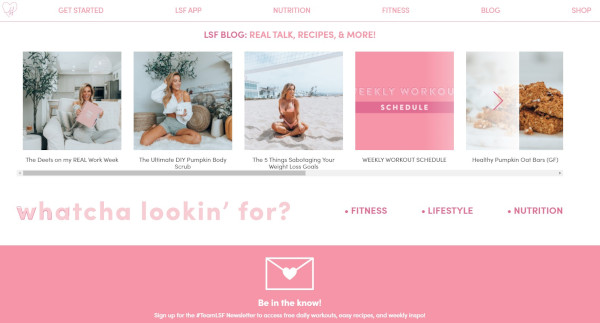
2. Grammarly
Grammarly is a niche blog that offers writing tips, articles on grammar, and even advice for writing projects such as resumes, professional communication, and thesis papers. Their mission is "To improve lives by improving communication," and their helpful content generates over 14 million organic visits per month. They use the brand awareness generated by this visibility to promote their grammar app and extension, which has a free version and a premium (paid) version.

3. PC Gamer
PC Gamer is a blog that provides reviews, demos, and news updates on gaming and gamer tech. Their content generates over 13 million organic visits per month, and they monetize this traffic with affiliate links.
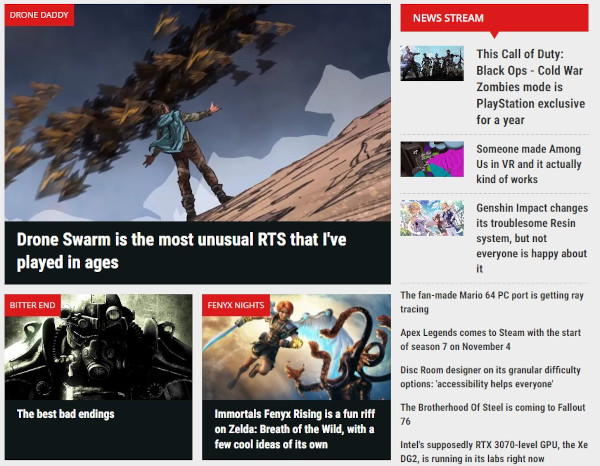
For example, this is a post about the best personal computers to buy for gaming, updated for 2020. The post brings readers suggestions about which computers are best for PC gaming, and nearly every product has an Amazon link.
Every time a user clicks on the Amazon link, the website earns a profit, as well as Amazon, which is one way the website can fund its expansive listicles.
4. Apartment Therapy
Apartment Therapy is a lifestyle blog that highlights interior design and home living topics, covering everything from trendy furniture to cleaning hacks and even money matters. It generates more than 1.6 million organic visits per month. It monetizes this traffic with sponsored posts (like the one below), banner ads, and affiliate links.

5. PS I'm on my way
PS I'm on my way is a travel blog run by Trisha Velarmino and as she travels the world and learns about other cultures. Her content earns over 1,400 organic visits per month (and more from social media), and she's been featured on a number of publications from Cosmo to Tripadvisor. She monetizes her blog by offering travel coaching services and digital courses. In addition, the sidebar on her blog includes banner ads.

6. Lauren Conrad
Lauren Conrad's blog is a lifestyle and fashion blog, and primarily reports on trends and product launches, bringing in more than 57,000 organic visits per month. Lauren Conrad is considered an influencer, and this status helps her earn partnerships to monetize her content.
This piece highlights another fashion influencer, Jessi Burrone, the model for the photos in this post. LC and Burrone partner together on numerous shoots for the website.
If seen sporting a brand's fashion, like Burrone is (she's wearing LC clothes in the photos), some followers might see that and say to themselves, "Well, now I need this sweater if Jessi has it."
7. Nerdwallet
Nerdwallet is an app for comparing credit cards and making smart money moves. Pretty much their whole business model revolves around their content, which drives over 11 million organic visits per month to their website. Their app is free, but they make money from affiliate partnerships with lending institutions and credit card companies.
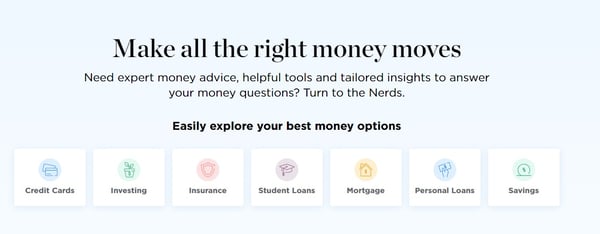
8. Rookie Moms
Rookie Moms is a blog championing #MomLife and discussing all topics/issues related to parenting. Their blog is a powerhouse that brings in over 22,000 organic visits per month and generates income from banner ads and affiliate product links.
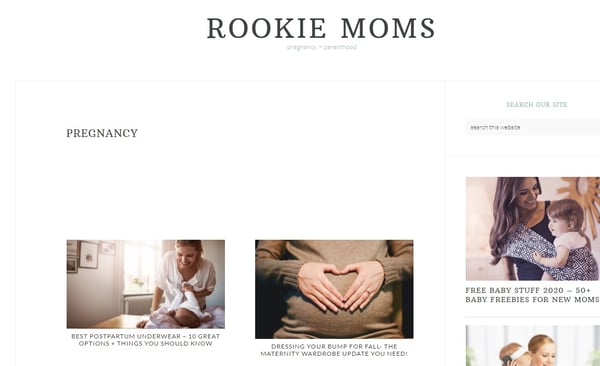
If you have passion to share and an audience ready to receive your insight, monetizing is definitely on the table once you start generating real interest. The hard part is getting started and creating the value that will get people to come. With a content management system and some elbow grease, you'll be well on your way.
Editor's note: This post was originally published in April 2020 and has been updated for comprehensiveness.
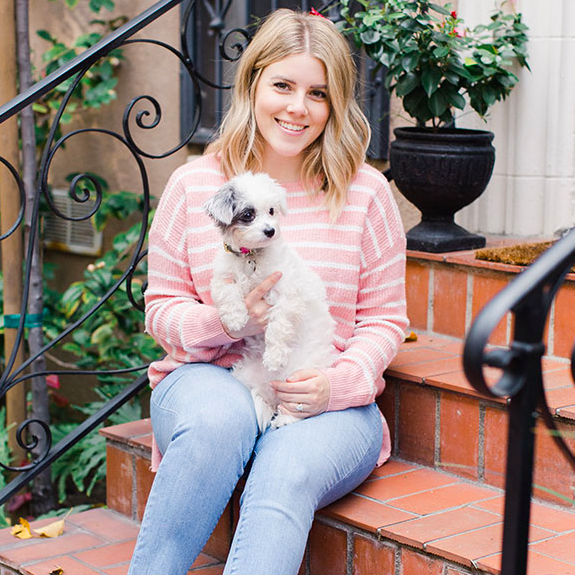
No comments:
Post a Comment